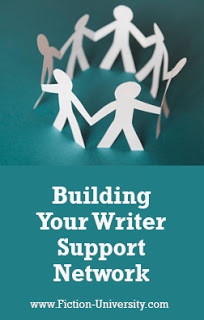Janice Hardy's Blog, page 34
December 15, 2020
Keep Your Writing Routine from Becoming a Rut
 By Shanna Swendson, @ShannaSwendson
By Shanna Swendson, @ShannaSwendsonPart of The Writer’s Life Series
JH: Falling into the "same old, same old" can be counterproductive for writers. Shanna Swendson shares tips on shaking up your routine and boosting your creativity.
Shanna Swendson earned a journalism degree from the University of Texas but decided it was more fun to make up the people she wrote about and became a novelist. She’s written a number of fantasy novels for teens and adults, including the Enchanted, Inc. series and the Rebel Mechanics series. She devotes her spare time to reading, knitting, and music. Her newest novel is the paranormal mystery Interview with a Dead Editor .
Website | Twitter | Facebook | Goodreads
Take it away Shanna…
Continue ReadingWritten by Janice Hardy. Fiction-University.com
Published on December 15, 2020 03:00
December 14, 2020
3 Steps to Crafting a Stronger First Draft
 By Janice Hardy, @Janice_Hardy
By Janice Hardy, @Janice_Hardy Don’t just write a good book. Write a great story.
Fiction is an odd combination of skills. The craft of writing is technical, with rules and techniques that achieve different results, yet the art of storytelling is visceral, relying on creativity and instinct to pluck the best pieces from our imagination.
While the story is often what grabs us first, it can quickly get overshadowed by the technical aspects. Is the opening line hooking readers? Should this be first or third person? Is there too much backstory? Instead of crafting a story readers can’t put down, we’re counting how many adverbs are in each chapter.
This can lead to technically well-written novels, but not great stories.
Now, I’m not saying ignore the technical side of writing—that’s how you bring a wonderful story to life—but don’t lose sight of the joy and magic you felt when that story idea originally came to you.
Continue ReadingWritten by Janice Hardy. Fiction-University.com
Published on December 14, 2020 03:00
December 12, 2020
WIP Diagnostic: Is This Working? A Closer Look at a YA Suspense Opening
 Critique By Janice Hardy, @Janice_Hardy
Critique By Janice Hardy, @Janice_HardyWIP Diagnostics is a weekly column that studies a snippet of a work in progress for specific issues. Readers are encouraged to send in work with questions, and we diagnose it on the site. It’s part critique, part example, and designed to help the submitter as well as anyone else having a similar problem.
If you're interested in submitting to WIP Diagnostics, please check out these guidelines.
Submissions currently in the queue: Three
Please Note: As of today, critique slots are booked through January 2.
This week’s questions:
1. Does this pique interest?
2. Is it too slow?
Market/Genre: Young Adult Suspense
On to the diagnosis…
Continue ReadingWritten by Janice Hardy. Fiction-University.com
Published on December 12, 2020 05:03
December 10, 2020
The Best Writing Tool You’ve Never Heard Of
 By Dario Ciriello, @Dario_Ciriello
By Dario Ciriello, @Dario_Ciriello Part of The Writer's Life Series
JH: If you're looking for a way to be productive without distractions, Dario Ciriello shares his experience with the Alphasmart Neo.
I was talking to a friend a few weeks ago and bemoaning my recent complete inability — or should I say lack of interest — in getting words on paper. Beyond the usual procrastination and displacement activity common to us all, I tried to defend my laziness with a number of pathetic excuses.
First, working as a freelance editor exacerbates my already dire tendency to edit as I write.
When I do try to write, everything from names to esoteric technology demands a quick detour onto the Internet, which I confess I enjoy a great deal more than writing.Continue ReadingWritten by Janice Hardy. Fiction-University.com
Published on December 10, 2020 03:00
December 9, 2020
5 Ways to Fix a Stalled Scene in Your Novel
 By Janice Hardy, @Janice_Hardy
By Janice Hardy, @Janice_HardyIt’s a terrible feeling when the scene you’re working on grinds to a halt—and you have no idea how to get it moving again.
Imagine it—you’re in the middle of a writing session, your fingers are dancing over the keyboard, and suddenly…
They stop.
The words, your fingers, your understanding of what comes next in your novel.
Your scene has stalled and you don’t know why, and what’s worse, you have no idea what to do to fix it.
We’ve all been there, and it doesn’t matter if you’re a brand-new writer working on your first story or a professional author with fifty published novels. Sometimes, scenes just stall. Ideas poof out of your head and leave you hanging. Your characters stop talking to you, and the last thing they said was so out of the blue that you can’t fathom what they meant by it or what they plan to do.
Continue ReadingWritten by Janice Hardy. Fiction-University.com
Published on December 09, 2020 04:00
December 8, 2020
4 Essentials of Unforgettable Endings
 By Laurence MacNaughton, @LMacNaughton
By Laurence MacNaughton, @LMacNaughtonPart of The How They Do It Series
JH: A solid ending not only satisfies readers, but makes them eager to reader your next novel. Laurence MacNaughton shares four tips on how to write unforgettable endings.
It's possible that more writers struggle with the ending of a story than the blank page at the beginning. The good news is, writing a terrific ending is easier than you think. Just follow these four steps.
1. Put the main character in the driver's seat.
This is potentially the best thing you could do to wrap up your story: make sure your main character is the one who makes the ending happen.
Continue ReadingWritten by Janice Hardy. Fiction-University.com
Published on December 08, 2020 03:00
December 7, 2020
An Easy Way to Create Conflict in Your Novel
 By Janice Hardy, @Janice_Hardy
By Janice Hardy, @Janice_Hardy Conflict is vital to a novel, but that doesn't mean it has to be a fight.
A common misconception with conflict is that is has to be antagonistic. Characters should fight, argue, and plot against each other in the worst ways, but this is just one of the many ways in which you can create trouble in your novel.
It's also one of the least interesting, because with most antagonistic fights, there's one right side and one wrong side. Usually, the protagonist is on the right side, so all we're really doing is writing an argument readers already agree with—which might work for reality TV, but it's not as much fun in a novel.
Friendly disagreements can also create conflict, especially between people who love each other dearly.
The disagreement you have with your spouse affects you much more strongly than the one you have with a co-worker you barely know. Having characters disagree on what to do or how to behave offers layers of both external plot conflict and internal emotional conflict.
Continue ReadingWritten by Janice Hardy. Fiction-University.com
Published on December 07, 2020 03:12
December 3, 2020
Editorial Feedback: Friend or Foe?
 By Sherry Howard, @SherLHoward
By Sherry Howard, @SherLHowardPart of The Writer's Life Series
JH: Feedback is a valuable part of the writing process, but it can also be intimidating. Sherry Howard discusses why you don't need to be afraid of what people think of your writing.
Sherry Howard lives with her children and silly dogs in Middletown, Kentucky. Sherry is the author of the picture book ROCK AND ROLL WOODS, with a starred Kirkus review. Her poems and stories have appeared in multiple journals and anthologies. She also writes for the educational market, with about a dozen books. Her middle grade book, SPIRITS AMONG US, released in October.
Sherry Howard | Facebook | Twitter | Instagram
Take it away Sherry...
Continue ReadingWritten by Janice Hardy. Fiction-University.com
Published on December 03, 2020 03:00
December 2, 2020
How to Sneak Clues Past Your Readers and Keep Them Guessing
 By Janice Hardy, @Janice_Hardy
By Janice Hardy, @Janice_HardySome writers weave clues so seamlessly into a novel, we never even realize they’re there until they all converge in the end.
My subconscious is a better writer than I am. It drops in details and makes connections in my first drafts that I don’t see until the next draft—if at all.
Sometimes, it takes the sharp eyes of my critique group to spot the "clever things" I’ve written that I’m totally unaware of (grin).
I suspect your subconscious does this, too.
It’s only natural. Stories churn in our heads even when we aren’t consciously thinking about them. Our brains remember throwaway details and build on them without our input.
And when we make the connections, we get that rush and think, “oooo that is soooo cool.”
Continue ReadingWritten by Janice Hardy. Fiction-University.com
Published on December 02, 2020 03:00
December 1, 2020
Building Your Writer Support Network
 By Jodi Turchin, @jlturchin
By Jodi Turchin, @jlturchinPart of The Writer's Life Series
JH: Writing is a tough business, so it's important for writers to build a strong support system. Jodi Turchin shares tips on building a support network to get you through the tough times, as well as celebrate the good.
Jodi Turchin is a Young Adult novelist represented by Dawn Frederick at Red Sofa Literary. She’s also a photographer, a high school English teacher, an adjunct college professor, and a former actress and director.
Website | Twitter
Take it away Jodi…
Continue ReadingWritten by Janice Hardy. Fiction-University.com
Published on December 01, 2020 03:24



